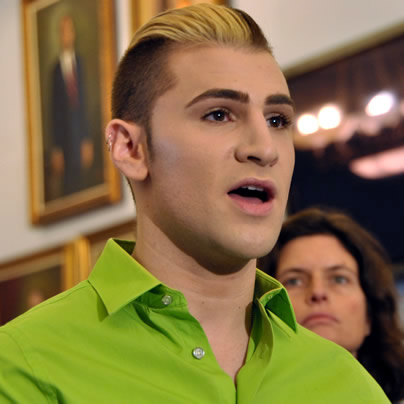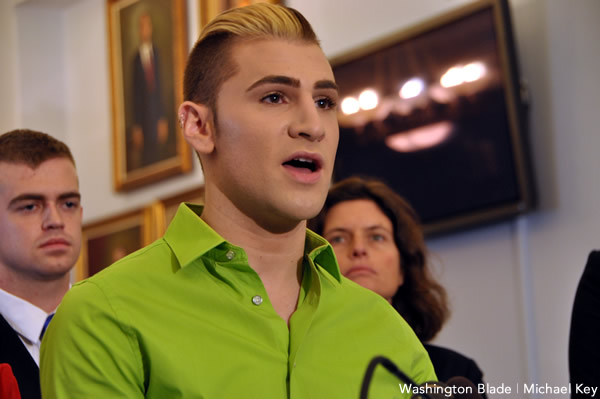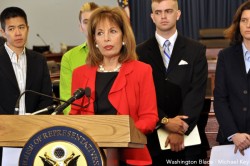National
Rep. Speier introduces resolution condemning ‘conversion’ therapy
Seeks to ‘protect minors’ from debunked practice


Sheldon Bruck, who is gay, said he is a survivor of conversion therapy. (Washington Blade photo by Michael Key)
U.S. Rep. Jackie Speier (D-Calif.) introduced a resolution into the House of Representatives on Wednesday declaring that efforts by mental health practitioners to change someone’s sexual orientation or gender identity or expression are “dangerous and harmful.”
“It is the sense of Congress that sexual orientation and gender identity or expression change efforts directed at minors are discredited and ineffective, have no legitimate therapeutic purpose, and are dangerous and harmful,” the resolution states.
“Congress encourages each state to take steps to protect minors from efforts that promote or promise to change sexual orientation or gender identity or expression, based on the premise that homosexuality or transgender identity is a mental illness or developmental disorder that can or should be cured,” the resolution states.
Speier introduced her non-binding resolution one day after the Southern Poverty Law Center filed a lawsuit in New Jersey on behalf of four gay men and two parents against a New Jersey based counseling group that performs conversion therapy. The lawsuit charges Jews Offering New Alternatives for Healing (JONAH) with committing consumer fraud by falsely claiming the gay men could change their sexual orientation from gay to straight.
“Let’s get this straight,” Speier said at Capitol Hill news conference called to announce the introduction of her resolution. “Being gay, lesbian, transgender is not a disease that can be cured or a mental health issue that can be treated. Sadly, not everyone gets this,” she said.
“A quick Internet search will bring up some 80 practitioners and groups that promise to help individuals to become heterosexual,” she told the news conference. “Gay conversion has become a multimillion dollar industry.”
Speier said she and her staff were investigating whether some of these practitioners and organizations, most of whom are unlicensed, were being paid to perform conversion therapy on patients who pay them through federal programs such as Medicaid or TRICARE, a federal medical program that assists military veterans.
“In my cursory investigation, I have found two additional instances of so-called mental health professionals that advertise these services and appear to be eligible for federal dollars,” she said. “This morning, I sent letters of inquiry to Medicaid and TRICARE to determine if these instances reflect systemic weaknesses that allow federal taxpayer dollars to go to harmful, illegitimate medical services.”
Also speaking at the news conference were Sheldon Bruck and Jerry Spencer, who described themselves as gay men and survivors of conversion therapy. Bruck and his mother are among the plaintiffs in the lawsuit filed on t heir behalf by the Southern Poverty Law Center against the New Jersey based JONAH group.
Spencer, 23, said his conservative Catholic parents pressured him into undergoing conversion therapy when he was 14 and the therapy lasted more than five years before he chose to end it.
“It was all a scam,” he said. But before he came to that realization, the therapy resulted in “deep emotional scars” both for him and his family.
“I’m telling my story to help others,” he said. “This industry preys on gay people and their families.”
Speier’s office said Reps. Ted Deutch (D-Fla.) and David Cicilline (D-R.I.) signed on as co-sponsors for the resolution. Speier said she couldn’t immediately determine which House committee would be assigned to consider the resolution. Rep. Barney Frank (D-Mass.), who is gay, has said he doesn’t expect the Republican-controlled House will pass any LGBT supportive bills or resolutions over the next two years.
Representatives of the Human Rights Campaign, Southern Poverty Law Center, and the National Center for Lesbian Rights also spoke at the news conference.
U.S. Supreme Court
Supreme Court to consider bans on trans athletes in school sports
27 states have passed laws limiting participation in athletics programs

The U.S. Supreme Court on Thursday agreed to hear two cases involving transgender youth challenging bans prohibiting them from participating in school sports.
In Little v. Hecox, plaintiffs represented by the ACLU, Legal Voice, and the law firm Cooley are challenging Idaho’s 2020 ban, which requires sex testing to adjudicate questions of an athlete’s eligibility.
The 9th U.S. Circuit Court of Appeals described the process in a 2023 decision halting the policy’s enforcement pending an outcome in the litigation. The “sex dispute verification process, whereby any individual can ‘dispute’ the sex of any female student athlete in the state of Idaho,” the court wrote, would “require her to undergo intrusive medical procedures to verify her sex, including gynecological exams.”
In West Virginia v. B.P.J., Lambda Legal, the ACLU, the ACLU of West Virginia, and Cooley are representing a trans middle school student challenging the Mountain State’s 2021 ban on trans athletes.
The plaintiff was participating in cross country when the law was passed, taking puberty blockers that would have significantly reduced the chances that she could have a physiological advantage over cisgender peers.
“Like any other educational program, school athletic programs should be accessible for everyone regardless of their sex or transgender status,” said Joshua Block, senior counsel for the ACLU’s LGBTQ and HIV Project. “Trans kids play sports for the same reasons their peers do — to learn perseverance, dedication, teamwork, and to simply have fun with their friends,” Block said.
He added, “Categorically excluding kids from school sports just because they are transgender will only make our schools less safe and more hurtful places for all youth. We believe the lower courts were right to block these discriminatory laws, and we will continue to defend the freedom of all kids to play.”
“Our client just wants to play sports with her friends and peers,” said Lambda Legal Senior Counsel Tara Borelli. “Everyone understands the value of participating in team athletics, for fitness, leadership, socialization, and myriad other benefits.”
Borelli continued, “The U.S. Court of Appeals for the Fourth Circuit last April issued a thoughtful and thorough ruling allowing B.P.J. to continue participating in track events. That well-reasoned decision should stand the test of time, and we stand ready to defend it.”
Shortly after taking control of both legislative chambers, Republican members of Congress tried — unsuccessfully — to pass a national ban like those now enforced in 27 states since 2020.
Federal Government
UPenn erases Lia Thomas’s records as part of settlement with White House
University agreed to ban trans women from women’s sports teams

In a settlement with the Trump-Vance administration announced on Tuesday, the University of Pennsylvania will ban transgender athletes from competing and erase swimming records set by transgender former student Lia Thomas.
The U.S. Department of Education’s Office for Civil Rights found the university in violation of Title IX, the federal rights law barring sex based discrimination in educational institutions, by “permitting males to compete in women’s intercollegiate athletics and to occupy women-only intimate facilities.”
The statement issued by University of Pennsylvania President J. Larry Jameson highlighted how the law’s interpretation was changed substantially under President Donald Trump’s second term.
“The Department of Education OCR investigated the participation of one transgender athlete on the women’s swimming team three years ago, during the 2021-2022 swim season,” he wrote. “At that time, Penn was in compliance with NCAA eligibility rules and Title IX as then interpreted.”
Jameson continued, “Penn has always followed — and continues to follow — Title IX and the applicable policy of the NCAA regarding transgender athletes. NCAA eligibility rules changed in February 2025 with Executive Orders 14168 and 14201 and Penn will continue to adhere to these new rules.”
Writing that “we acknowledge that some student-athletes were disadvantaged by these rules” in place while Thomas was allowed to compete, the university president added, “We recognize this and will apologize to those who experienced a competitive disadvantage or experienced anxiety because of the policies in effect at the time.”
“Today’s resolution agreement with UPenn is yet another example of the Trump effect in action,” Education Secretary Linda McMahon said in a statement. “Thanks to the leadership of President Trump, UPenn has agreed both to apologize for its past Title IX violations and to ensure that women’s sports are protected at the university for future generations of female athletes.”
Under former President Joe Biden, the department’s Office of Civil Rights sought to protect against anti-LGBTQ discrimination in education, bringing investigations and enforcement actions in cases where school officials might, for example, require trans students to use restrooms and facilities consistent with their birth sex or fail to respond to peer harassment over their gender identity.
Much of the legal reasoning behind the Biden-Harris administration’s positions extended from the 2020 U.S. Supreme Court case Bostock v. Clayton County, which found that sex-based discrimination includes that which is based on sexual orientation or gender identity under Title VII rules covering employment practices.
The Trump-Vance administration last week put the state of California on notice that its trans athlete policies were, or once were, in violation of Title IX, which comes amid the ongoing battle with Maine over the same issue.
New York
Two teens shot steps from Stonewall Inn after NYC Pride parade
One of the victims remains in critical condition

On Sunday night, following the annual NYC Pride March, two girls were shot in Sheridan Square, feet away from the historic Stonewall Inn.
According to an NYPD report, the two girls, aged 16 and 17, were shot around 10:15 p.m. as Pride festivities began to wind down. The 16-year-old was struck in the head and, according to police sources, is said to be in critical condition, while the 17-year-old was said to be in stable condition.
The Washington Blade confirmed with the NYPD the details from the police reports and learned no arrests had been made as of noon Monday.
The shooting took place in the Greenwich Village neighborhood of Manhattan, mere feet away from the most famous gay bar in the city — if not the world — the Stonewall Inn. Earlier that day, hundreds of thousands of people marched down Christopher Street to celebrate 55 years of LGBTQ people standing up for their rights.
In June 1969, after police raided the Stonewall Inn, members of the LGBTQ community pushed back, sparking what became known as the Stonewall riots. Over the course of two days, LGBTQ New Yorkers protested the discriminatory policing of queer spaces across the city and mobilized to speak out — and throw bottles if need be — at officers attempting to suppress their existence.
The following year, LGBTQ people returned to the Stonewall Inn and marched through the same streets where queer New Yorkers had been arrested, marking the first “Gay Pride March” in history and declaring that LGBTQ people were not going anywhere.
New York State Assemblywoman Deborah Glick, whose district includes Greenwich Village, took to social media to comment on the shooting.
“After decades of peaceful Pride celebrations — this year gun fire and two people shot near the Stonewall Inn is a reminder that gun violence is everywhere,” the lesbian lawmaker said on X. “Guns are a problem despite the NRA BS.”
-

 Sports5 days ago
Sports5 days agoTrans cyclist’s victory sparks outrage in conservative media
-

 Israel5 days ago
Israel5 days agoActivist recalls experience in Tel Aviv after Israel-Iran war began
-

 Movies4 days ago
Movies4 days agoTwo new documentaries highlight trans history
-

 Real Estate4 days ago
Real Estate4 days agoCelebrate the power of homeownership this Fourth of July













